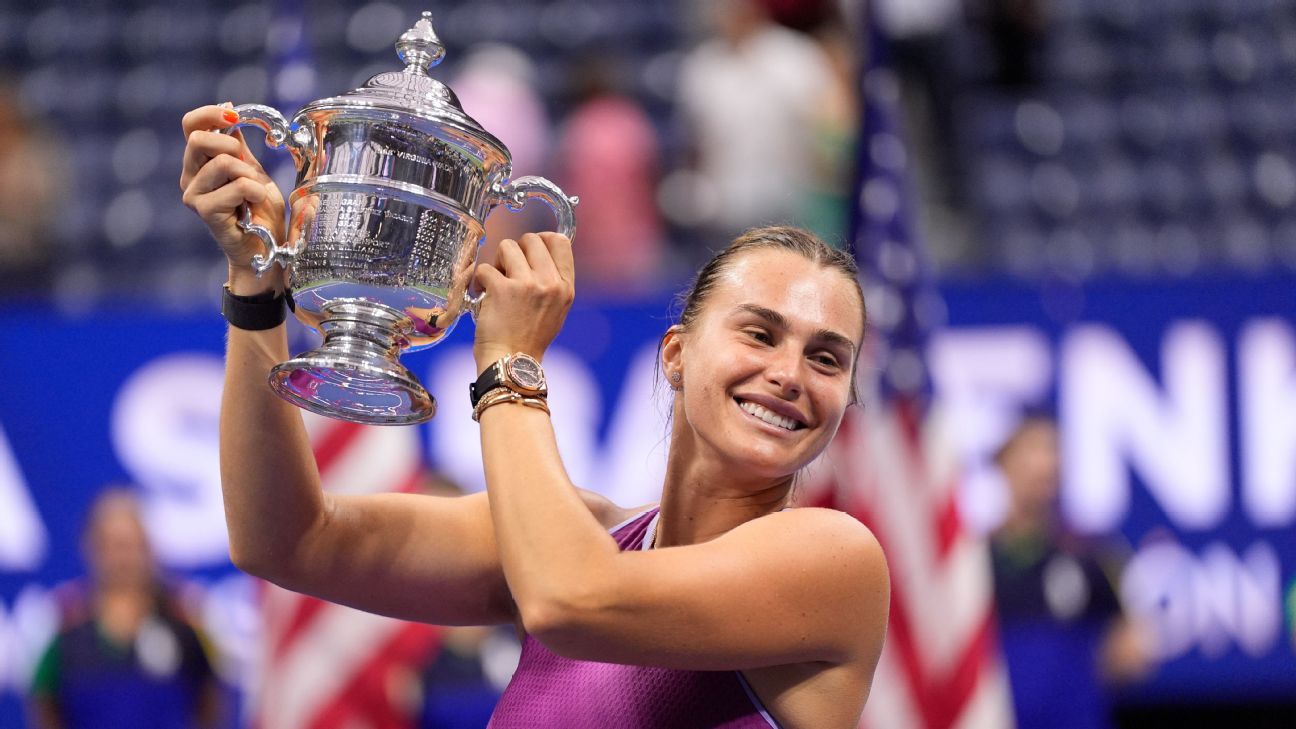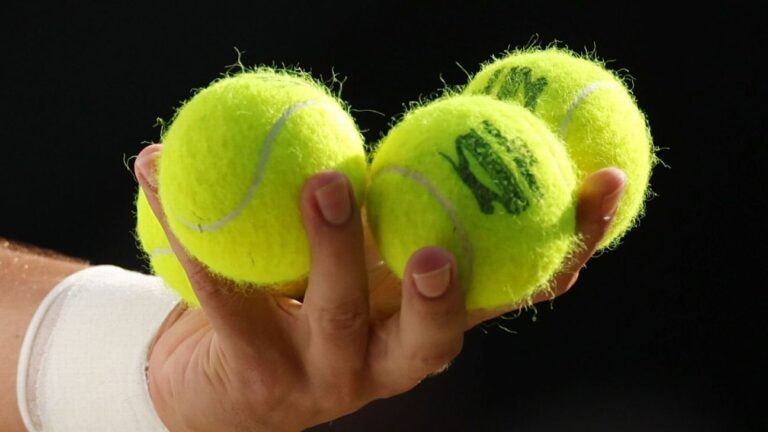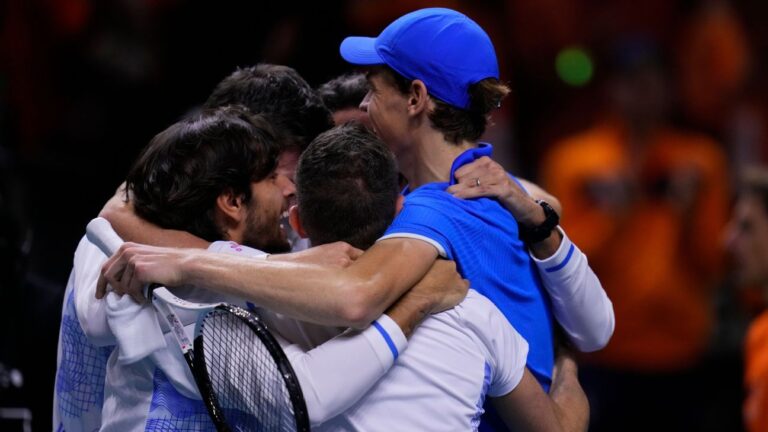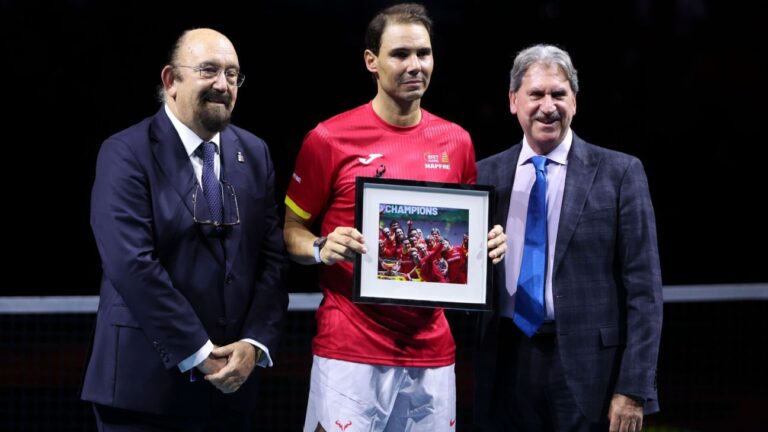NEW YORK — Aryna Sabalenka left the US Open in tears 12 months ago as the runner-up. She exited in the semifinals each of the two years before that. This time, Sabalenka was in a joking mood after winning her first championship at Flushing Meadows and the third Grand Slam title of her career.
Sabalenka, the No. 2 seed, got past No. 6 Jessica Pegula 7-5, 7-5 in a rollicking final under a closed retractable roof at Arthur Ashe Stadium on Saturday, adding this triumph to the two she earned at the Australian Open each of the past two seasons, also on hard courts.
“Oh, my God. I’m speechless right now. So many times, I thought I was so close to get a US Open title. It’s been a dream of mine. Finally, I got this beautiful trophy. It means a lot,” said Sabalenka, from Belarus, who is on a 12-match winning streak.
“I remember,” Sabalenka, 26, said, “all those tough losses in the past here.”
Editor’s Picks
2 Related
That includes in the semifinals in both 2021, against Leylah Fernandez, and 2022, against No. 1 Iga Swiatek.
Most poignant, of course, was last year, when Sabalenka was rattled by the Ashe crowd, blew a set advantage and was defeated by Coco Gauff. Like Gauff, Pegula is an American, but the spectators were far more generous toward Sabalenka on Saturday, applauding her best efforts and even obliging when she waved her arms to ask for extra noise.
She is the sixth different woman to win the US Open after losing in the final the previous year, and first since Serena Williams in 2012
Pegula, a native New Yorker whose parents own the NFL’s Buffalo Bills and NHL’s Buffalo Sabres, was participating in a major final for the first time at age 30. She has won 15 of her past 17 matches over the past month; both losses came against Sabalenka.
“I know how tough it is to lose in the final, but you’re showing some amazing tennis, and I’m more than sure that one day, you’re going to get one,” Sabalenka told Pegula during the on-court ceremony, then paused and added with a chuckle: “I mean, not [just] one. Maybe more. But let’s start from one Grand Slam.”
To Pegula’s credit, she did not fold after Sabalenka reeled off five consecutive games to grab the opening set and move ahead 3-0 in the second. In the next game, Pegula dropped a point and showed her frustration by whacking a ball off the video wall behind the baseline, dislodging a little square panel.
Maybe that released some tension, because suddenly Pegula asserted herself, using her own five-game run to go up 5-3. But when she served at 5-4 with a chance to force a third set, Pegula let Sabalenka level the second with a break.
“Was able to find some good tennis, just wasn’t quite able to sustain it,” Pegula said. “She played some big tennis in big moments.”
Indeed, that began a three-game surge for Sabalenka, who soon was collapsing to the court, dropping her racket and covering her face with both arms. She is the fifth different woman to win the Australian Open and US Open in the same year since 1988, when the Australian major switched to hard court.
(2) Sabalenka def. (6) Pegula: 7-5, 7-5
• Third career major singles title for Sabalenka (also won 2023 Australian Open, 2024 Australian Open)
• Sabalenka finished year 18-1 in majors, tied with Jasmine Paolini for most major match wins among women in 2024
• Trailed 5-3 in the second set, but won 16 of the match’s final 23 points
• Dominated the long points, winning 12 of the 15 rallies lasting 9+ shots in the match
• Sabalenka’s 43rd match win at a hardcourt major since start of 2021 (most by any man or woman over that span)
• Pegula will move up to No. 3 when new WTA rankings release Monday
• Third US Open women’s final in Open era (since 1968) where each of first 2 sets went past 5-all; others were in 1973 (Margaret Court & Evonne Goolagong) and 2013 (Serena Williams & Victoria Azarenka)
— ESPN Stats & Information
Sabalenka sputtered at the start Saturday, falling behind 2-0, then being a point from trailing 3-1. But she reacted to mistakes by calmly turning her back and taking deep breaths as star athletes from other sports, such as Stephen Curry, Lewis Hamilton and Noah Lyles, looked on from the stands.
Once Sabalenka got going, once her booming strokes — her forehands were the fastest of the past two weeks, speedier than any woman’s or man’s — were calibrated just so, it became apparent the outcome would be determined by what she did.
By the close, the statistics made that obvious: Sabalenka finished with far more winners than Pegula, 40-17, and also more unforced errors, 34-22. Sabalenka controlled most exchanges — winning 12 of the 15 rallies lasting 9 or more shots — with Pegula mainly stuck responding as best she could.
“She’s super powerful. Goes for her shots. She’s definitely not going to give you anything,” Pegula said. “I was happy I was able to fight back and give myself a chance, but in the end it wasn’t enough.”
“In that second set, honestly, I was just praying there,” said Sabalenka, who collected a $3.6 million winner’s check. “I was literally standing there and praying.”
Sabalenka concludes the Grand Slam calendar having won 37 of the 40 sets she has played in majors this season (92.5%) — the highest percentage of sets won in majors by any woman in a year since Justine Henin (92.9%) in 2007 (min. 30 sets played).
ESPN Stats & Information and The Associated Press contributed to this report.







